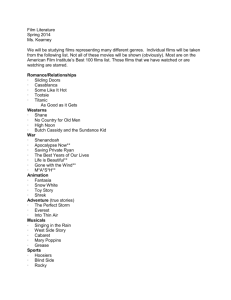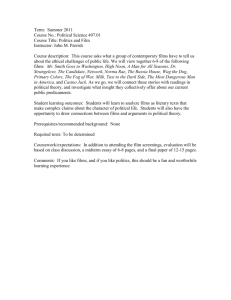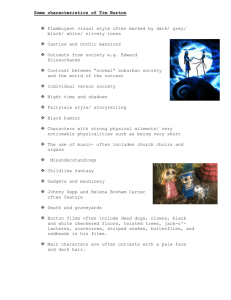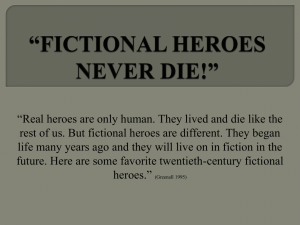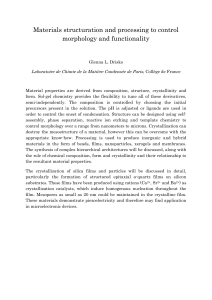Genres of cinema, summarized
advertisement
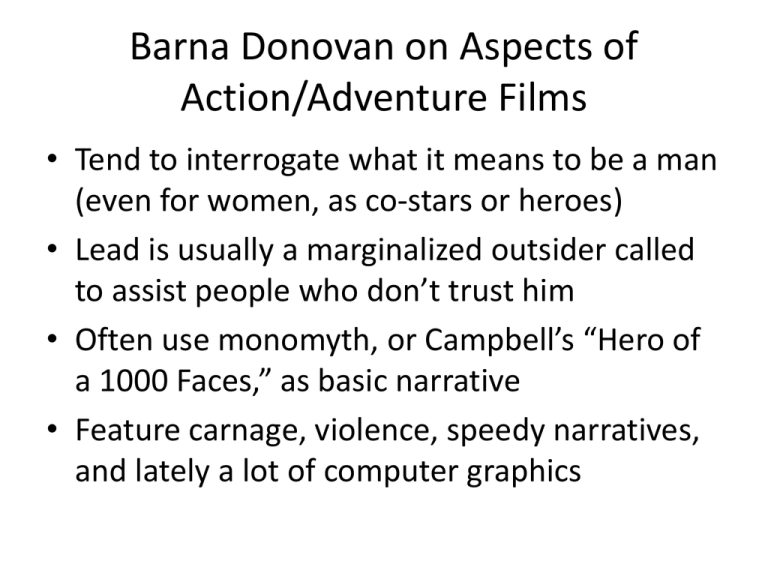
Barna Donovan on Aspects of Action/Adventure Films • Tend to interrogate what it means to be a man (even for women, as co-stars or heroes) • Lead is usually a marginalized outsider called to assist people who don’t trust him • Often use monomyth, or Campbell’s “Hero of a 1000 Faces,” as basic narrative • Feature carnage, violence, speedy narratives, and lately a lot of computer graphics Paul Wells on Aspects of Animation 1. 2. 3. 4. 5. Motion-based: “What the animator does on each frame of film is not as important as what he or she does in between” – viewer seeks closure akin to montage, but on more minute scale of flow Authorial-power-privileging: Similar to art cinema, viewer is aware of author’s power (author could do anything), thus wonders why story is being told this way, looks for rationale and authorial unity Associative: “Intrinsically interrogates the phenomena it represents and offers new and alternative perspectives and knowledge”; makes surface more visible, tracks implications of motion, gives forms new embodiment in purely qualitative, unreal instances so their essence may be revealed Self-reflexive: Knowingness exposes “complexities of its own illusions…to offer the simultaneity of insight and reference” Surreal or dream-like: Deliberately juxtaposes unusual and unexpected elements within nominally plausible, fictionally consistent environments – uses this quality for comedy or nightmare Germaine Dulac on Aspects of the Avant-Garde • Technique “breaks with established traditions to search out…new emotional chords” • Egoistic, i.e, based on personal thought AND altruistic, i.e., concerned only with progress • Industry may or may not think of art; avant-garde only tries to be art – is “other” to industry • “Pure cinema”: nature’s unseen processes, the invisible, the imponderable, abstract movement • Tries to free cinema from existing arts and bring back its “essential considerations”: movement, rhythm, life, and dreams Thomas Leitch on Aspects of Crime Films • By definition crime is an aberration, a disruption to the normal workings of society; yet crime films treat crime as normal even as they observe how it undermines social order • Criminal behavior in crime films rides tension between being abnormal and all too normal • Crime is metaphor, critique of social order • Individual must overcome even well-meaning community; victims must turn vigilante, good cops must bypass corrupt justice system • Three key roles: the criminal, the victim, and the avenger/detective – films are about the breakdowns and renewals of boundaries between the three key roles • In the end, a contradiction: films valorize these boundaries to affirm order EVEN AS they explore permeability between boundaries to mount a critique that challenges that order Michael Renov on Reasons for Documentary 1. To record, reveal, or preserve – capturing “the imponderable movement of the real” 2. To persuade or promote – selling products or values, rallying support, solidifying identity 3. To analyze or interrogate – often to pose and resolve puzzles or mysteries 4. To express – to privilege truth over beauty, yet also to expose that as a false binary Paul Jennings on Aspects of Fantasy • A central situation that defies rational or even pseudo-scientific explanation • Often, inexplicable world is contrasted to a conventional “reality” from which the characters have come and to which they may return; hero almost always chooses the “home” where they will have love and acceptance • Major theme is discovery of joy; hero goes from drab existence to a full, rich and wondrous life • Other major theme is freedom; hero can personally choose how to live, not be bound by duty or unhappy traditions; hero can overcome anything (implying death is a release or an illusion) • Three common types: superhuman, child hero, and wise mentor • Distinct from: symbolic/allegorical films, non-narrative avant-garde films, religious-based films, or films where fantasies are used primarily for comedy, erotic, or musical devices Robin Wood on Aspects of Horror • Normality is threatened by the Other/Monster • “They are our collective nightmares” and signify the return of the repressed (because in our monogamous, family-oriented culture, the repressed must return) • Lowness of genre (just “escapism”), ordinariness works to lower our guard • Monster may come from family but now opposes it; family must be defended • Pre-1960s, Monster was foreign; post-1960s, Monster often American, and annihilation is inevitable and humanity is powerless to stop it • Release of sexuality is always perverted, monstrous, and excessive • “Progressive” to the extent that they question absolute evil of Monster, “reactionary” to the extent that they don’t Linda Williams on Aspects of Melodrama 1. Begins, and wants to end, in a “space of innocence” 2. Focuses on victim-heroes and recognizing their virtue, thus orchestrating moral legibility 3. Uses dialectic of pathos and action – a give and take of “too late” and “in the nick of time” 4. Borrows from realism but realism serves pathos and action 5. Presents characters who embody simplified good and evil Robert Stam on “Meta”-films • Also called reflexive, self-referential: refers to the process by which films foreground their own production • Subvert the assumption that movies are a transparent means of communication by turning the mirror back on themselves • Remind the viewer of their constructed nature • Not always anti-illusion; can be just as fictional as fiction, depending how they’re done Richard Dyer on Aspects of Musical Films • Entertainment through song, dance, and narrative designed to provide pleasure • Three kinds of musicals, all privileging utopia: Show Musical where narrative and number are separate; Folk Musical where narrative = problems and number = escape, but papered over with devices like “cue for a song”; Fairy-Tale Musical where narrative world is already utopian/dreamlike • Abundance instead of scarcity • Energy instead of exhaustion • Intensity instead of dreariness • Transparency instead of manipulation • Community instead of fragmentation Wes Gehring on Aspects of Parody Comedy • Has two types: overt and reaffirmative • Provides humor based on distorted imitation of a familiar genre or auteur • Like musical, not bound by time and place, but upon finding one, makes itself different/odd • Offers “creative criticism,” educational insights • Is distinct from satire (about structure, not society) • Compounds more than one target subject • Is self-conscious about itself as film Carrie Preston on Traits of Romantic Comedy • Development of love between two main characters is the main story line • Various obstacles, goals, plotlines, characters, misunderstandings keep our leads apart for much of the film, often including chasing lost lovers or that one character is engaged to wrong person • Confidant character acts as sounding board, listens to lead’s inner feelings – much more in comedy than drama • Visualization of transformation as one or both leads becomes more ready for other • Often no sex before “true love”; if sex is too early, seen as impulsive mistake • In comedy, typically ending in marriage; not so in drama Geoff King & Tanya Krzywinska on Aspects of Science Fiction • Human v. products of science, technology, and rationality • Navigates tension between utopia and dystopia – science is useful only up to a point, and one can never control messiness of life (could be seen as conservative, liberal, or both) • Robots and aliens are “good” if human-helpful; when “bad” read as metaphors for threats to humanity (or just white male America) • Travels in space, time and scale implicitly raise concerns of our real world, often passed over rapidly to get to spectacle and entertainment • Contentious political issues form a point of reference, partly to lure viewers with the promise of forbidden elements, but these are not explored in detail, and sidelined in favor of magical reconciliation and individual achievement • Tension between realism and fantasy but tendency toward latter (“what is a realistic representation of something unknown?”) Andrew Klavan on Aspects of War Films • They depict the external and internal struggles of people who defend the nation • The films explore contradiction: to defend home, must be estranged from it; to defend values, must contravene them; to defend civilization and peace, must learn fluency in uncivilized violence • Tension between patriotism and anti-nationalism, between glory and futility • Pre-1970, warrior’s sacrifice of self is necessary, inspiring; post-1970 it is a “spiritual death” • May focus on war and battles, or sometimes prison, covert ops, training, civilian struggles during war
